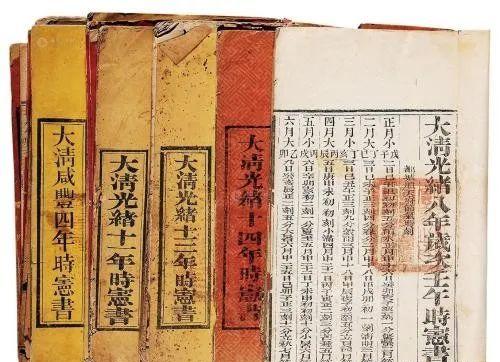Chinese civilization has a long history, before the Qin Dynasty, there were many ancestors of wisdom crystallized into books, but unfortunately few can be handed down, the ancient Six Calendars, which have a profound impact on Chinese culture, is one of them.
The ancient six calendars refer to the Yellow Emperor calendar, the Huang Dynasty calendar, the Xia calendar, the Yin calendar, the Weekly calendar, and the Lu calendar. It is the earliest calendar in our country.
It was used before Emperor Wu of the Han Dynasty promulgated and implemented the Taichu Calendar, but its original has long been lost, and now it can only be deduced from historical documents.

With the understanding of Chinese people on Sinology, the status of the traditional Chinese calendar has also been continuously improved, and during the Republic of China, China began to use the Western calendar as a chronological calendar, and has been used to this day.
The traditional calendar has appeared several times in the central debate meeting, but finally lost, and now China's calendar uses the Western Yuan era as the main lunar calendar as a supplement.
01. Yellow Emperor Calendar
The Yellow Emperor Calendar is a traditional Chinese calendar, and a large number of historical texts record that it was formulated by the people who ordered people to unify the world after the Yellow Emperor defeated Xuan You.
The Yellow Emperor Chronicle has a far-reaching influence, the lunar calendar and the Taoist calendar all began in the Yellow Emperor Chronicle as the first year, the year when the traditional Chinese calendar began, and the history is called Kaiyuan.
02. The Calendar of the Emperor
The "Lunar Calendar" was already formulated on weekends, and after the unification of the Qin Dynasty, it was promulgated throughout the country, with October as the first year. The calendar of the early Han Dynasty basically followed the Qin calendar.
It had two major characteristics: First, at that time, the Qin regime was still in Yongzhou and did not interact with the princely states. At that time, the ancient quaternion theory was very mature, and the so-called "Lunar Calendar" was only a difference in the construction of the month, but the calendar was still formulated by a "domain man" who came down the mountain with an ancient quaternion method.
03. Summer calendar
Legend has it that the calendar was founded by the Xia Dynasty, and the rules of the original calendar have been lost, and now only some content is known from some ancient books. The summer calendar takes the moon as a month around the earth, that is, the synodic month is used as the basis for determining the calendar month, and a month is called "synodic month".
The summer calendar reflects the law of the moon rotating around the earth. The Moon orbits the Earth for one month.
04. Calendar
The Yin calendar refers to one of the six ancient calendars that originated in the early years of the Warring States and passed down from the early Han Dynasty.
The Book of the Later Han Dynasty, The Chronicle of the Laws of the Later Han Dynasty: "The Yellow Emperor, the Yellow Emperor, the Emperor, the Emperor, the Xia, the Yin, the Zhou, and the Lu, the six families, each with its own yuan."
05. Weekly calendar
A type of ancient calendar. Zhou Li Jianzi, with the sub-month as the first year.
06. Lu Calendar
It is a kind of calendar used by the State of Lu during the Spring and Autumn Period and the Warring States Period, and the rules of the original calendar have been lost, and now only the general content can be learned from some ancient books.
At that time, the State of Lu was a small country, but the Lu Calendar could be recorded as the Ancient Six Calendars by historical books such as the Book of Han, mainly because Confucius revised the history of Lu Yin from the year of the Common Era to the fourteenth year of the Duke of Lu'ai into a history book based on the historical data of the State of Lu, and this history book was called "Spring and Autumn".
Because the ancient six calendars have long been lost, among them, the "Lunar Calendar" has only excavated some data in archaeology, and the other five calendars have only preserved some fragments of information, which is a pity.